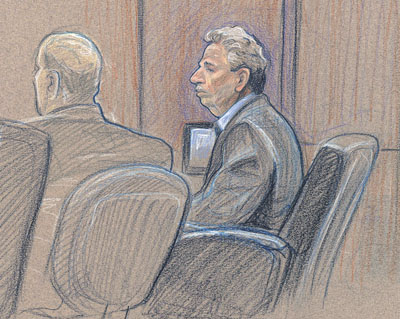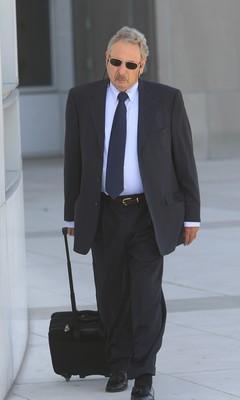Bribe allegations rebutted
Donald Davidson doesn't dispute that former Clark County Commissioner Erin Kenny received a $200,000 payoff for ushering through a zoning change that allowed a controversial CVS Pharmacy to be built adjacent to a residential area, his attorney Dominic Gentile said Thursday.
But Kenny didn't get the money from Davidson, Gentile told jurors.
During opening statements Gentile suggested developer Tommy Fehrman, who stood to benefit from a commercial zoning designation, paid Kenny. Gentile said Fehrman was in negotiations to buy the five-acre parcel at Buffalo Drive and Desert Inn Road. The sale was contingent on the zoning change.
Fehrman, who did not return a phone call Thursday, is expected to testify during Davidson's trial. Gentile said Davidson will too and will deny having played a role in the payment to Kenny.
"The essence of this case at the end of the day is the believability of the person who gets on that witness stand," Gentile said.
When Fehrman takes the stand in U.S. District Judge Roger Hunt's courtroom, he will "say Don Davidson directed him" to pay Kenny, Gentile predicted.
"We will demonstrate that is not the case," Gentile added.
A 2005 indictment charges Davidson, 73, with paying Kenny the $200,000 in exchange for her assistance on the zoning change in 2001. The indictment says Davidson's son, Lawrence Davidson, established a trust fund to hide the illicit payoff.
Kenny had also expected another $200,000 to help with an unrelated project the next year, Gentile said. That project, Gentile said, was also pitched by Fehrman, and Davidson was not involved.
That 2002 proposal caused a stir because it involved building houses under a busy McCarran International Airport flight path. Despite strong opposition from airport administrators and county planners, Kenny voted in favor of the development.
Prior to the vote, Kenny's accountant, Daniel Geiger, discussed with Kenny another $200,000 that the commissioner expected to receive and stow away in the trust, Gentile said.
Gentile speculated that the money never landed in the trust because the commission ultimately rescinded the vote.
Gentile said prior to the CVS vote and the commission's ruling on the housing development, Fehrman and his associates showered Kenny with campaign contributions.
Kenny pleaded guilty in 2003 to accepting bribe money from strip club owner Michael Galardi. During interviews with the FBI, Kenny revealed she also sold her votes to Davidson. Her accountant, Geiger, pleaded guilty earlier this month to honest services fraud after he acknowledged that he helped establish the secret trust and knew about the money from Davidson.
Earlier Thursday, Assistant U.S. Attorney Daniel Schiess painted a different picture of the payment to Kenny for her assistance with the CVS vote.
He said Fehrman offered Davidson a 15 percent interest in his partnership if Davidson could persuade commissioners to approve a commercial zoning designation. Fehrman also agreed to provide Davidson with a $200,000 bonus, Schiess said.
After commissioners voted in favor of the zoning amendment, Davidson told Fehrman to send $100,000 to his son, who was in charge of Kenny's trust, Schiess said. In 2002, after commissioners approved a use permit to allow CVS Pharmacy to build a store on the property, Davidson told Fehrman to send his son another check, the prosecutor said.
He said Davidson is guilty of depriving Clark County residents of their right to receive honest services from public officials because he was involved in a conspiracy with Kenny.
"When any person buys a public officials' loyalty, that person also cheats the public," Schiess said.
Schiess explained that Kenny and Davidson established their corrupt relationship before the controversy over the CVS store.
In 2000, Davidson worked for Triple Five Development, a company owned by the Canadian-based Ghermezian family. Davidson solicited the help of Kenny to amend zoning designations and pave the way for a casino near neighborhoods off Grand Canyon Drive and Flamingo Road.
Kenny again resisted protests from opponents of the project and voted for the casino.
Although the casino was never built, Eskander Ghermezian thanked Kenny for risking her political career by supporting his proposal, Schiess said. Ghermezian told the commissioner, "I owe you a life debt," Schiess said.
In February 2000, Kenny accepted a job creating brochures for Triple Five and received $3,000 a month. But the work didn't last.
"Soon, the work stopped, but the money didn't," Schiess said.
During monthly meetings between 2000 through 2003, Davidson delivered $3,000 a month to Kenny on behalf of the Ghermezians, Schiess said. A 2006 indictment charges Davidson with making the illegal payments to Kenny and conspiring with the commissioner to keep their deal secret. That conspiracy count was added to the charges of conspiracy, mail fraud and money laundering Davidson was already facing from a related 2005 indictment.
"When Erin Kenny received that money, Erin Kenny knew two things were happening," Schiess explained. "Ghermezian was paying his life debt, and the defendant, who was delivering the money, was buying her loyalty."
Gentile argued that Kenny's relationship with Triple Five began before Davidson entered the picture. She hit the company up for campaign contributions in 1997. Employees of the company worked on her campaign.
He said Davidson was not behind the monthly payments alleged by the government.
"She curried favor with the people at Triple Five from top to middle to bottom," Gentile said.
Unlike the bribery case that snared Galardi, Kenny and her former colleagues Lance Malone, Dario Herrera and Mary Kincaid-Chauncey, the federal government did not capture meetings between Davidson and Kenny on video or audio tape.
Because Malone's phone was tapped during the Galardi probe, Davidson is heard discussing an attempt to share "five dimes" with former Las Vegas City Councilman Michael McDonald for his assistance on a zoning matter. Schiess played a snippet of the tape to jurors and explained that "five dimes" meant $50,000.
McDonald refused the bribe, prosecutors said.
Gentile urged jurors not to misinterpret bits and pieces of conversations.
"If you listen to the tape recordings with suspicion, they will sound suspicious," he said. "If you listen to them with a presumption of innocence and wait for an explanation, you will hear the explanation."
Both Schiess and Gentile told the jury to cautiously weigh the testimony of Kenny and Geiger. Their plea agreements allow for more lenient sentences if they provide substantial help to the government.
The attorneys also reminded jurors that Kenny suffers from memory loss. Neither lawyer hid their feelings about the government's star witness.
"The government's view of Erin Kenny? She's corrupt. She's a crook," Schiess said.
"She suffers from vertigo; she's lost her memory," Gentile said. "It's for you to decide whether that's believable or whether that's confabulated or whether she's lying."
JUDGE PUTS OFF GALARDI'S PRISON SENTENCE Former strip club owner Michael Galardi was awarded a two-week reprieve to surrender to federal prison after explaining that he needs additional time to put his affairs in order. Despite strong opposition from acting U.S. Attorney Steve Myhre, U.S. District Judge Larry Hicks allowed Galardi until July 6. Hicks sentenced Galardi to 30 months in prison on March 12. The judge granted Galardi's request to self-surrender in June, so that he could take care of his young children until the end of the school year. Hicks set the surrender date for today. Galardi pleaded guilty in 2003 of bribing elected officials in exchange for votes that benefited his strip club empire. He has requested to be placed in a federal prison in Taft, Calif. REVIEW-JOURNAL


















